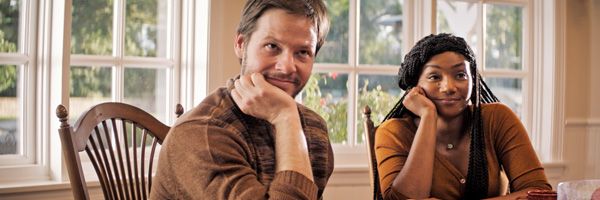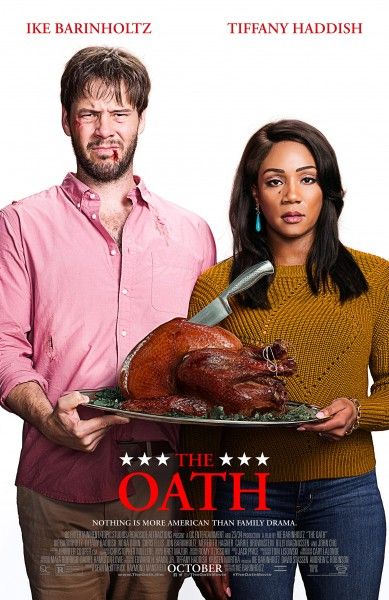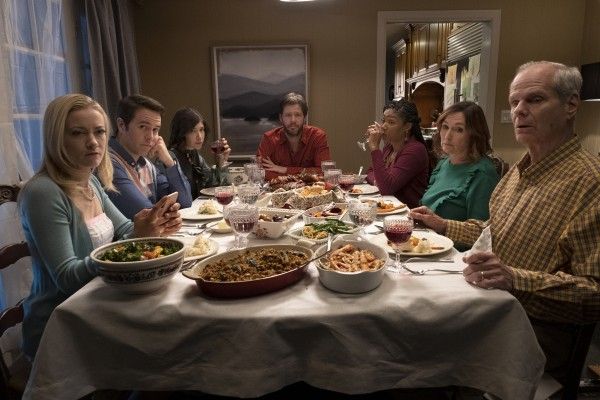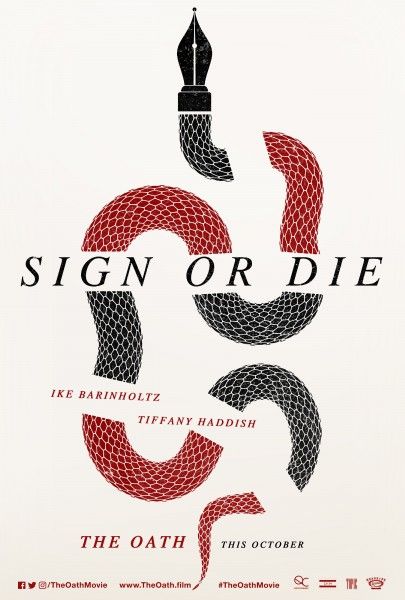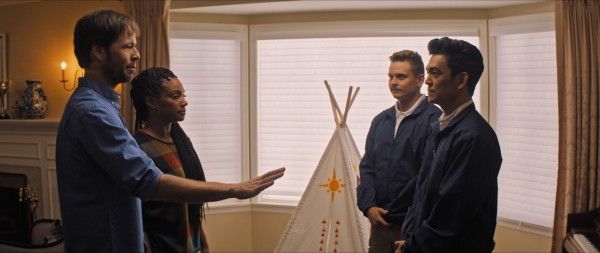This weekend, Ike Barinholtz’ directorial debut, The Oath, hits theaters. The film is set in an America where the President has requested that citizens take a loyalty oath and do so by the day after Thanksgiving. Liberal couple Chris (Barinholtz) and Kai (Tiffany Haddish) are hosting their family for Thanksgiving, and trying to keep things civil, but the holiday keeps deteriorating as political tensions become more heated.
Last month, I got to sit down with Barinholtz in Atlanta to talk about the movie. We talked about what he learned from friends and family screenings, specifically from fellow directors Jordan Peele, Mindy Kaling, and Seth Rogen, how he approached directing his brother Jon Barinholtz, weaving in a thriller element, the political elements of the movie, and more.
Check out the full interview below. The Oath opens October 12th.
How's the press tour treating you?
IKE BARINHOLTZ: Pretty great. Yeah, we were kind of bummed we couldn't make it to the screening because of United Airlines. But, we just did a big old swing through Texas and, I was just telling them for the last five months, the only people that have seen this movie have been people who I've known, friends, "Check it out, give me some notes." So, now that we're really letting real Americans seeing it, it is pretty exhilarating.
What have you learned from those friends and family screenings? What was the feedback they had?
BARINHOLTZ: Everything from macro notes, to character notes, to practical things. Jordan Peele gave me some really great advice. He said, "You know, you have these really tense moments, and then you cut it with a joke, which is so great." There were a couple of moments where I had another joke after that, and that's a hat on a hat, we call it. And so, there was that ... Mindy Kaling had a ... there was a big scene towards the end of the movie that, it was a fine scene. It was very long, and wrappy-uppy, and Mindy Kaling was like, yeah, you should cut that scene.
The second she said that, I was like, "Yeah." So yeah, it was really great to get that feedback, but now, to watch people who know nothing about it, or maybe they saw a trailer, watch it, and have these reactions, where they're like, everything from, "That's my family! You've been watching my family!" To people telling me how tense they were, how scared they were, how much they laughed, it makes the last year worth it.
One of the things that really leaped out at me is how much the film is like how fragile America is, and that sort of tension between everything could just tip over, and how much people want to hold on to that normalcy. Can you talk a little bit about trying to find that balance, and the writing process, and also, when you direct it?
BARINHOLTZ: That's a great question. You know, I, like a lot of people, was so freaked out, not even ... just shell-shocked by the election. What's going on? This America we thought we knew was so different and stuff. So, I didn't want to make it a political film. I wanted to make it about people's reactions to politics, and how I have been watching people, otherwise smart, normal people's brains break, myself included first.
I was going crazy, where I was constantly reading the news, non-stop. "Oh my God, did you hear about this? Oh, this is crazy!" Which is bad, and I really ... I think politics have become so absurd, and the best thing to do is vote. But, the second-best thing to do is, take a step back, and laugh at it a little bit, and remember ... try to remember who we are.
I think in terms of balancing the ends of the political spectrum, it was important that every character, if this is the American screen right here, and I tried my best to get characters all across the spectrum. You've got everyone from super, uber-liberal, like my character's probably like a Bernie Sanders socialist, and then Mason is, basically a fascist. So, we wanted to show everyone in between, and it was very important that we show everyone warts and all.
The bad version of this movie is Chris, my character is, he's the most liberal, and he's the best, and he's the smartest, and he is making the right decisions, and he's kind. Who the fuck wants to see that movie? You know, I certainly don't.
So, to take that character that I am, which is the most liberal, but also the worst-behaved, and a jerk, and obsessed, and ignoring his wife and child, and saying the c-word, and stuff like that, you know what I mean? So, I think look, there is this contingent of people in this country, a small, very small minority that will never see this, because they don't really want to, but I've been really pleasantly, enthusiastically just thrilled with feedback, not just from people who I would presume are center, left of center, left.
People who are right ... I had a lady who worked for Greg Abbott, the governor of Texas, who was decidedly Republican, see the screening in Austin, and she had great thoughts, and she really enjoyed it. So to me, I want to make a movie where people can go, and they can laugh at this family falling apart, because it's not their family.
But I that it's not a film that's about like, all politics is silly. It actually is about investment, but also questioning how we invest in that.
BARINHOLTZ: Yes, I think the wrong way to do it is, if you are just super plugged in, and you're letting in control you, and you're letting it dictate every decision you make. That can't be good. The flip side of that coin, I know some people who are like, "I just completely tune out of politics, and I listen to my music."
And I'm like, "That is terrible too." Because then you become like ... you internalize everything, and you become an internalized immigrant. You don't want to go where your country is. You're gonna go to this new country in your head, and not pay attention, and we start unplugging, and then that's only going to lead us to ... that'll give us a Donald Trump Jr. as president, so I think yeah, it's not about politics. It's about this family reacting to it, and making the wrong decisions. Even as things get shittier, and shittier, they start to fall apart.
Your brother Jon Barinholtz is in the movie playing your brother. What’s it like to direct a family member?
BARINHOLTZ: Look, I knew early on, right away, that the most combative characters would be me and him, and his girlfriend, I include in that too, Abby. I was like, "I gotta cast my brother in this. I know he's a great actor." He's on an NBC sitcom called, "Superstore", but I knew that he's a great actor that I have so much emotional history with, that I will get mad at him, and I can more importantly get him mad at me. In those moments, I'm being a dick to him, not just like ... I wasn't abusive, but I was just like, "Come on man, let's go. I'm just trying to get this hit." And push him a little bit.
My mom saw the movie, and she goes, "There were scenes where you were being mean to Jonathan, and I could tell." But I told her, "Hey, I paid him, so he can stop complaining. Take it up with the union!" But, it was such a joy, and I thought he just did such a great job at it.
No, the relationship feels lived in for a reason.
BARINHOLTZ: Oh yeah, yeah, there's a lot of shit there.
When it comes to constructing the rest of the family, what was your process, and what are the characters we need to have? You talked a bit about the spectrum of the characters, but also, bringing it together, you've got this great middle-class modern family. It doesn't feel like a throwback; it definitely feels like it's today.
BARINHOLTZ: Yeah, I felt like almost for my blood family, basically just put us in a line, and put me to the far left, put Carrie Brownstein, my sister, next to me. Put my mom next to her, for she's really the center, and just doesn't want to get involved, right? That's a very mom thing. No fighting. Don't get involved. Dad, old-fashioned, loved Ronald Reagan, and then, my brother who ... Again, I'm including Abby with that, who's what I would call the new modern right, right? He's not all right, but he's just like, "Oh, it's fine what's going on out there. You're being hyper-reactive, and stuff."
So, I knew I wanted those archetypes, and I had cast in mind. I knew I wanted Carrie Brownstein, and I knew I wanted my brother, and I knew I wanted Nora Dunn, so yeah, I really wanted to cover, just in that one family alone, independent of all the other characters, just show really what I think the modern American political spectrum is.
You know, this film shifts. It starts getting more and tense, as it goes along. Can you talk about those thriller aspects, and how you wove those into the movie?
BARINHOLTZ: You know, I always knew that it was going to be this weird, satirical comedy, with these dark elements. I also knew that the first half of the film was gonna live more in that family dramedy, comedy holiday space. It was important that I punctuated those with some thrills. There's a road rage scene, and there's a guy yelling at a bar, and then some of the stuff we're seeing on TV. So, I wanted to take that part, and start spiking you a little bit, prep you for what's coming.
Then, the second half flips that, right? Where we're living in this thriller-y dark world, with periodic bursts of humor. So, to keep that tone, you want to make sure it's cohesive, and doesn't feel like two totally separate movies.
But, I've seen movies do that before. I've seen movies like, "Get Out" right? Which is very scary, but then it cuts Little Rel, who is hilarious, right? And MASH, or "Philomena". That movie, "Philomena" is about the Catholic church, I don't know, killing babies and stuff, but at the core of it is, this kind of two-hander comedy almost, right? So I knew it was possible, and when I wrote it, I was like, "I think it's gonna work." We're shooting it, it's like, I think it's gonna work, but you don't know if that tone works, until you see the cut, or the assemble. My amazing editor, Jack Price showed me the assembly, and the other producers, then we just took a breath. We were like, "It works. We know it works on some level. We have a lot of work to do, but we know that we are able to take the audience onto this emotional rollercoaster."
Again, getting those notes from Jordan Peele, who was like, gave me the practical note of like, "Hey, sometimes after something scary happens, and you put a joke, that's great, but you're putting two, three jokes after that, and it's tipping it too much, and you're falling into the comedy mode." So, there was a lot of ... we knew it was all there, we just needed to get it all in perfect balance.
Are you a director that, when you're doing the laugh line, likes to get some alts, and to have some choices, and to at least have the option of what joke you want to put, to relive the tension?
BARINHOLTZ: Yeah, there was ... you know, if you go do a big movie like, "Blockers", or a big broadsheet comedy, you straight up have the alt run. I knew we didn't really need that, per se, but I did want to give, once we shot the script a couple times, I did want to give the actors chances to open up, and throw some stuff in there. I got some of the best line ... look, I wish I could take credit for coming up with the term 'trash pussy'. I can't. That’s Tiffany Haddish improvising.
There were just a lot of moments like that. Meredith Hagner, who plays Abby, had so many little things that she threw in after, that you watch the movie, and you're like ... you watch the cut, and you're like, "Oh, I wish there was something going on here."
And then the editor's like, "Oh wait, I saw something that she said three takes in." And you find this little line, that she almost says as the camera's moving off her, but it gave us all these little pieces of connective tissue, which just added so much value to the movie.
I also like how the film was shot, because the way you frame your shots, there's always the way, like a two shot, or a three shot, where you're like, can this character be trusted? And with that sort of intention of always, when you went into frame, to keep the audience aware of everyone, rather than just hold on who's doing dialogue?
BARINHOLTZ: Well, we knew that 85% of this movie's in one location, and it's very easy to write a movie in one location. It's very difficult to shoot a movie in one location, without your audience getting eye-bored. So, what I did early on, I had these discussions with my DP, Cary [Lalonde], and I said, I want this movie to start, and the scenes at the house, I want to be as wide as we can, as much as we can. I want the colors to be bright, and vibrant, feel like you're watching almost like a really funny Nancy Meyers movie, right?
And then, as the shit starts to go down, you'll notice that the frames start tightening up, and the colors go from like a sunny yellow, to a dark orange, and by the time I got that gun at Mason, we are here. So, we really try to use the camera, to make sure that we're not just consistent with the tone, that it's cohesive, but that it's matching. It's appropriately making the audience go from like, "Oh, I can sit here watching this family argue." To, "Oh, get me out of this house. I'm freaking out." And that was one of the challenges.
Without going too much into spoilers, you talked a little bit about the ending of the film, how you wanted to wrap it up, and because this film, one of the things I like about it is, that it is unpredictable. It could have gone a bunch of different ways.
BARINHOLTZ: It could have gone a bunch of different ways. It was very important to me, that I end this movie as optimistically as I could. I am personally optimistic about America. I think one day, we'll have bad presidents again. We'll have crazy governments and stuff, but I do feel like America is bigger than one person. I feel like it's bigger than one concept.
So, it was important to me that ... There was some discussion early on, and some people said, "Well, maybe this person should die. Maybe we do go and bury their bodies, and maybe this ..." To me, I didn't want to do that. I wanted people to be so wrapped up that, they were outside of their mind, and about to do things that they would have thought were unthinkable 16 hours ago.
Then, be introduced to some new, significant information, and take that time, that short beat, to be like, oh, wait. Okay, everyone stop. And everyone is scarred after that, physically, and emotionally, but it was important that it moved past them, that they let it go beyond them, and it's behind them now, and they can move forward.
They'll never forget about what happened, but it was important to me, to feel like at the end of the movie ... I also wanted to treat the audience, like, I've just beat the shit out of you. I want you to just chill out at the end and watch a little bit of pie.
You've worked with different comedic directors. What kind of tips did you learn from them, having worked with different style makers?
BARINHOLTZ: God, I got such good stuff. You know, Jordan Peele told me, he's like, "You have to be somewhat malleable, but don't be malleable on concept, and story, and the core things that are important to you. Hold onto that, and that's what's gonna make this movie special." So, he gave me that. Mindy Kaling gave me just advice, when she saw the cut, about some scene changes, and stuff.
Seth Rogen gave me very good advice, that James Franco gave him, which is, when you're directing yourself, as an actor, a comedic actor especially, after two takes, you're like, "I got it. I got it. We can move on." And he's like, "If everyone of all the cast, if you gave them all two takes, give yourself three. Give yourself four." Because, your performance is not as good as you think it is, because you're so ... you're just not there. You're thinking about something else. You're in the moment, but you're also thinking about the stunt coordinator meeting that you have a 3:30, and you gotta go talk to him, and make sure the stunt's safe.
So, I gave myself a little bit more room, and that actually just made my performance a little bit better, but I think also gave us just a little more shit in scenes to play with, so that was really good advice.

